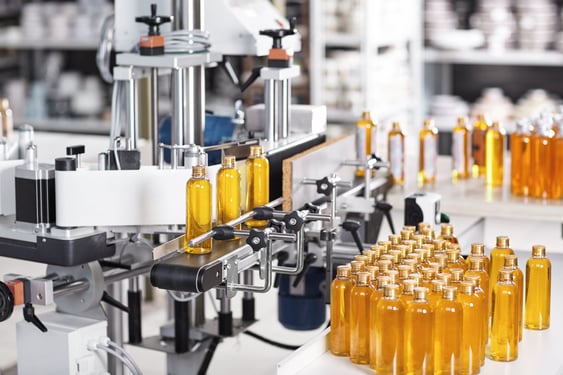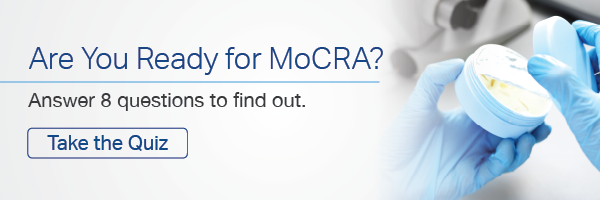MoCRA is here, and it’s reshaping the U.S. cosmetics industry. The MoCRA law covers a wide range of cosmetics and personal care products, and introduces new provisions and grants new powers to the FDA for regulating cosmetic products in the United States, including those that are imported.
In this post, we explain what the MoCRA FDA law could mean to your cosmetics company and how to prepare to meet regulatory requirements.
What is MoCRA?
MoCRA is an acronym for the “Modernization of Cosmetics Regulation Act of 2022”. It was signed into law in late December, 2022 as part of the Consolidated Appropriations Act of 2023 and is scheduled to take effect on December 29, 2023.
After a six-month delay, enforcement of the cosmetic product facility registration and cosmetic product listing requirements began July 1, 2024.
What does the MoCRA Cosmetics Law Do?
The FDA regulates cosmetics under the Federal Food, Drug, and Cosmetics Act (FDCA) of 1938. MoCRA gives the FDA significant new authorities and represents the first major cosmetics amendment to the FDCA since it was enacted.
In many respects, the FDA MoCRA cosmetics act makes mandatory areas that were not practiced by the U.S. cosmetic industry and those that the FDA had previously considered voluntary, such as facility and product registration and adhering to Good Manufacturing Practices (GMPs). The goal of MoCRA is to safeguard public health through tighter regulations on cosmetics manufacturers and processors.
.jpg?width=525&height=304&name=shutterstock_760624654%20(1).jpg)
MoCRA requires manufacturers and processors of cosmetics to register their facility and list their products with FDA.
What are the Important Provisions of the MoCRA Cosmetics Act?
MoCRA mandates several important provisions for cosmetics manufacturers and processors, including the following:
- Mandatory facility and product registration
- Adherence to cosmetics Good Manufacturing Practices (GMPs)
- Adverse event reporting
- Safety substantiation
- Additional labeling requirements
- New enforcement powers and records access for the FDA
Mandatory Facility and Product Registration
For years, the FDA (Agency) operated a Voluntary Cosmetic Registration Program (VCRP) for cosmetics manufacturers. The FDA used the program to provide the Agency with the “best estimate of information available about cosmetic products and ingredients, their frequency of use, and businesses engaged in their manufacture and distribution”.
The Cosmetic Ingredient Review (CIR) used information from the program to help it assess ingredient safety for public health.
With MoCRA, registration is longer be voluntary but is required for every cosmetics manufacturing facility, regardless of where it is located.
What’s more, MoCRA also mandates that all cosmetic products be listed with the FDA, including the following information:
- Place of manufacture
- Product category
- Ingredients (fragrances, flavors, & colors)
The FDA will assign each of your products a listing number.
The FDA introduced a new system for registering your facility - Cosmetics Direct. Use Cosmetics Direct to submit your facility and product listing information.
.jpg?width=525&height=350&name=shutterstock_360840389%20(1).jpg)
MoCRA will require manufacturers and processors of cosmetics products to adhere to Good Manufacturing Practices.
Good Manufacturing Practices (GMPs) Requirements
The FDA currently publishes non-binding Cosmetic Good Manufacturing Practices for the industry. MoCRA, however, directs the FDA to establish regulatory GMPs for cosmetics manufacturers that are consistent with national and international standards.
The FDA is expected to issue a proposed rule within two years of MoCRA taking effect. Within three years, the Agency is expected to issue a final rule.
At that time, cosmetics products that are manufactured or processed under conditions that fail to meet GMPs will be deemed adulterated, meaning they cannot be legally sold in the United States and a non-compliant cosmetics company could face severe penalties.
Although we cannot say for certain what the FDA will do, it’s safe to assume that the Agency will build upon its existing Draft Guidance for Industry: Cosmetic Good Manufacturing Practices.
It’s a good idea to download the document and begin reviewing the guidance in preparation for FDA’s Final Rule. Some important parts of the Draft Guidance are listed below:
- Documentation – When dealing with FDA regulations, the axiom, “If it’s not documented, it didn’t happen” always applies. Your documentation should define your organization’s practices, processes, and procedures.
- Records – Keep physical or digital records of your procedures, deviations from Standard Operating Procedures, justifications, methods, training, ingredients, and other important information.
- Buildings and Facilities – Your buildings and facilities should be of adequate size, design, and construction, and properly cleaned and maintained for manufacturing cosmetics. Floors, walls, and other surfaces should be smooth and easy to clean, and you should have a pest management program in place, in addition to other guidance.
- Equipment – Similarly, all equipment used to manufacture cosmetics should be clean, maintained, and fit for purpose.
- Personnel – Your personnel should have proper training for their job function and maintain adequate cleanliness.
- Raw Materials – All raw materials should by properly identified, stored, tested, inventoried, and handled. This includes storing them in closed containers off the floor that are well marked with identity, lot number, and control status.
- Production – It’s recommended that you write Standard Operating Procedures (SOPs) for your formulations, production processes, packaging instructions, equipment operating instructions, and other important procedures.
- Laboratory Controls – FDA recommends evaluating laboratory controls, including sample collection techniques, specifications, test methods, laboratory equipment, and technician qualifications.
- Internal Audit – Your organization should determine whether effective procedures for internal audits are followed and occur regularly or as needed.
- Complaints, Adverse Events, and Recalls – Review product complaints, consumer adverse event reports, and product recall files to determine kind, severity, products involved, and resolution.
That’s just the tip of the iceberg; following GMPs helps you manufacture products that are safe, but it takes full buy in from everyone in your organization to be successful. That’s why it’s a great idea to start planning now in preparation for the eventual cosmetics GMPs Final Rule.
Adverse Event Reporting
The MoCRA cosmetics law defines an adverse event as: “death, a life-threatening experience, inpatient hospitalization, persistent or significant disability or incapacity, congenital anomaly or birth defect, infection, significant disfigurement (serious or persistent rashes, second or third degree burns, hair loss, or persistent or significant alteration of appearance), or an event which requires medical intervention to prevent the health outcomes listed above.”
Prior to the MoCRA Act, if a cosmetics company filed a complaint about an adverse health event, it was not required to report the information to FDA.
MoCRA requires cosmetics companies to notify FDA of any adverse health event within 15 days of becoming aware of the issue. Records of adverse health events must be maintained for 6 years.
Safety Substantiation
Cosmetic products do not require FDA approval prior to being marketed in the U.S. (with the exception of some of their color additives). It falls upon the manufacturers to substantiate product safety.
MoCRA requires adequate safety substantiation prior to a product being sold in the U.S. The Act defines this as: tests, studies, research, analyses, or other information that is considered among experts to be sufficient to support a reasonable certainty that a cosmetic product is safe.
Products without adequate substantiation will be considered adulterated.
This provision emphasizes the importance of testing your ingredients and finished products at an accredited laboratory that used validated methods for cosmetic products, such as Certified Laboratories.
Under the FDA MoCRA cosmetics law, the FDA also has the power to access adverse event records. This allows the Agency to identify potentially hazardous products or ingredients and take action to help keep consumers safe.

Under MoCRA, product labels must include contact information for reporting of adverse health effects.
Labeling Requirements
MoCRA requires your product labels to include an address, phone number, or electronic means of contacting your company to report an adverse health event.
Professional cosmetic products must meet the same labeling requirements as consumer products, whereas previously they did not need to list their ingredients. The MoCRA FDA law also requires product labels to list each fragrance allergen in the product. Those that do not will be considered misbranded.
Does the MoCRA Cosmetics Law Include New Enforcement Provisions?
Yes. The MoCRA Act grants three new powers of enforcement to FDA that promise to reshape the industry:
- Expanded Records Access – As mentioned earlier, the FDA has the authority under the Act to access your adverse event records. It can also access records related to each of your products if there is reason to believe that a product or an ingredient is adulterated or poses a threat to public health.
- Authority to Suspend Registration or Product Listing – The FDA can terminate a product listing if there is a reasonable probability that the product could cause serious health problems. This means you cannot legally sell that product in the country until it is relisted. If the Agency believes other products manufactured in the facility may be affected, it can suspend the facility registration.
- Recall Authority – Prior to MoCRA, all product recalls for cosmetics were voluntary. The Act grants FDA the power to recall a product if there is a reasonable probability that it is adulterated, misbranded, or could cause serious health problems.
Does MoCRA Include Exemptions for Small Businesses?
Yes. Small businesses have simplified requirements, a longer compliance period, and other exemptions.
For example, small businesses qualify for a reduced period of three years for maintaining records if their average gross annual sales in the U.S. for the previous three-year period is less than $1 million and they do not manufacture certain products that come into contact with the mucus membrane of the eye, are designed to be injected, are intended for internal use, or that alter one’s appearance for more than 24 hours.
Small businesses that meet the above requirements are also exempt from mandatory GMPs, facility registration, and product listings.
What Should I Do Ensure Compliance With the MoCRA Cosmetics Act?
Learn everything about the MoCRA Act that you can, which you can review in the Consolidated Appropriations Act of 2023, beginning in Subtitle E – Cosmetics on page 1,389 of this document.
- Perform a GAP analysis on your current systems and update your SOPs to close those gaps.
- Update and implement policies that account for MoCRA requirements.
- Ensure appropriate training of staff.
- Prepare for inspections that may seek information required by MoCRA.
- Ensure compliance by the dates established in MoCRA.
- Work with suppliers to establish contractual relationships to meet MoCRA requirements.
- Monitor FDA closely for updates and guidance.
- Be prepared to comment on proposed FDA regulations.
It’s also a good idea to review FDA’s Draft Guidance for Industry: Cosmetics Good Manufacturing Practices. Compare the requirements to your current practices to gauge your readiness to meet mandatory GMPs after the Final Rule is issued.
Develop a robust safety substantiation program to include product testing with an accredited laboratory that uses validated methods, such as Certified Laboratories. You can never be too prepared when it comes to product safety.
Finally, enlist the help of a regulatory consultant with experience in the cosmetics industry, such as EAS Consulting Group.
MoCRA includes several provisions, and non-compliance could elicit severe penalties, so it pays to understand the regulations.


